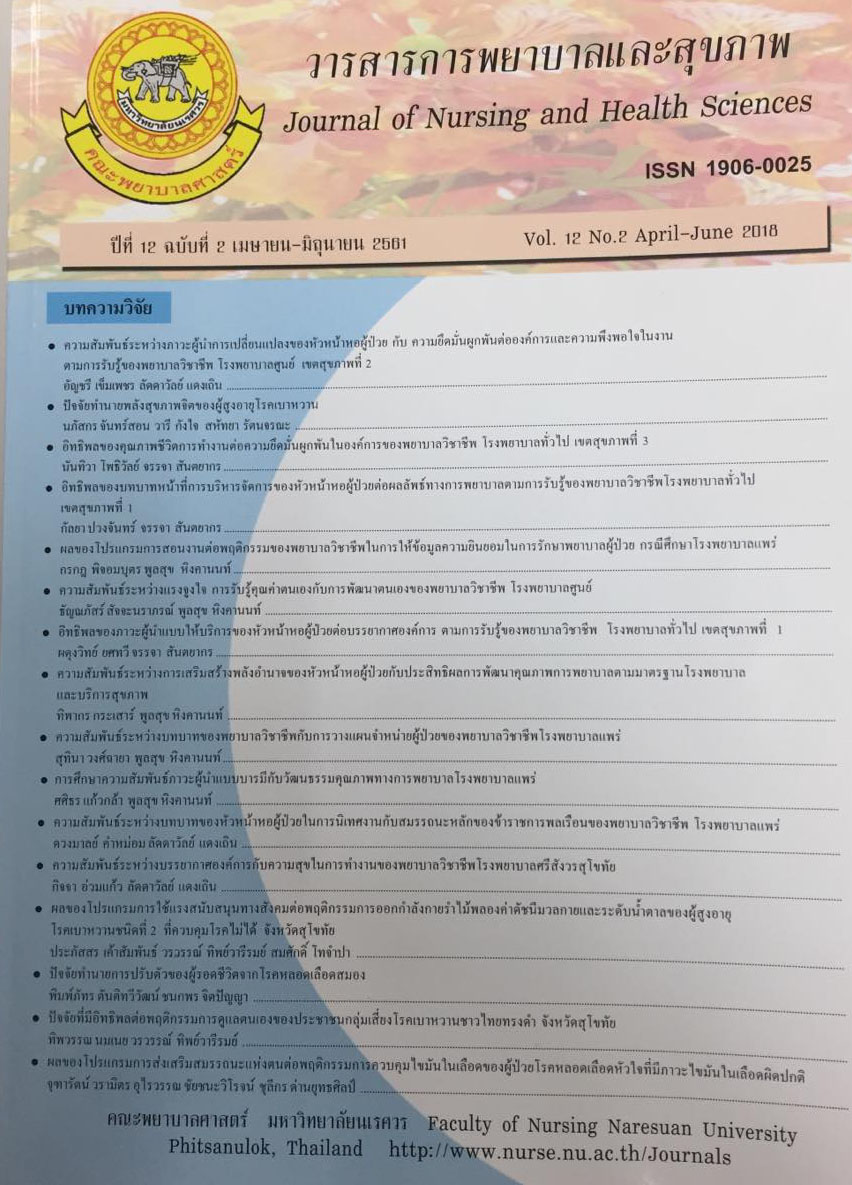ผลของโปรแกรมการส่งเสริมสมรรถนะแห่งตนต่อพฤติกรรมการควบคุมไขมันในเลือดของผู้ป่วย โรคหลอดเลือดหัวใจที่มีภาวะไขมันในเลือดผิดปกติ
Main Article Content
บทคัดย่อ
การวิจัยครั้งนี้เป็นการวิจัยกึ่งทดลองแบบเปรียบเทียบสองกลุ่มก่อนและหลังการทดลอง มีวัตถุประสงค์ เพื่อศึกษาผลของโปรแกรมการส่งเสริมสมรรถนะแห่งตนต่อพฤติกรรมการควบคุมไขมันในเลือด กลุ่มตัวอย่างคือผู้ป่วยโรคหลอดเลือดหัวใจที่มีภาวะไขมันในเลือดผิดปกติอายุ 30 ปีขึ้นไปจำนวน 60 คน แบง่ เปน็ กลุม่ ควบคุมและกลุม่ ทดลอง กลุม่ ละ 30 คน กลุม่ ควบคุมไดรั้บการพยาบาลตามปกติ กลุม่ ทดลอง เข้าร่วมโปรแกรมการส่งเสริมสมรรถนะแห่งตนในการควบคุมพฤติกรรมการควบคุมไขมันในเลือด เครื่องมือที่ใช้ในการทดลองคือ โปรแกรมการส่งเสริมสมรรถนะแห่งตนโดยใช้แนวคิดการรับรู้สมรรถนะ แห่งตนของแบนดูรา เครื่องมือที่ใช้ในการรวบรวมข้อมูลคือแบบสอบถามพฤติกรรมการควบคุมไขมัน ในเลือด ค่าความตรง = 0.88 ค่าความเที่ยง = 0.86 วิเคราะห์ข้อมูลด้วยสถิติเชิงพรรณนา และสถิติทดสอบที ผลการวิจัยพบว่า 1)กลุ่มทดลองมีค่าเฉลี่ยคะแนนพฤติกรรมการควบคุมไขมันในเลือดภายหลังทดลอง ( = 4.47, SD = .11) สูงกว่าก่อนทดลอง ( = 3.97, SD = .26) อย่างมีนัยสำคัญทางสถิติ (t = 11.11, p < .001) 2)ค่าเฉลี่ยคะแนนพฤติกรรมการควบคุมไขมันในเลือดของกลุ่มทดลอง ( = 4.47, SD =.11) สูงกว่ากลุ่มควบคุม ( = 4.06, SD = .32) อย่างมีนัยสำคัญ ทางสถิติ (t = 6.51, p < .001)
Article Details
เอกสารอ้างอิง
การจัดการตนเองของผู้ป่วยโรคกล้ามเนื้อหัวใจ
ตายเฉียบพลัน. วารสารไทยเภสัชศาสตร์และ
วิทยาการสุขภาพ, 9(3), 112-119.
เนติมา คูนีย์. (2557). การทบทวนวรรณกรรม:สถานการณ์
ปัจจุบันและรูปแบบการบริหารด้านโรคไม่ติดต่อ
เรื้อรัง. กรุงเทพฯ: อาร์ต ควอลิไฟท์ จำกัด.
พรทนา พฤกษ์ธรางกูร. (2552). ผลของโปรแกรมส่งเสริม
การรับรู้สมรรถนะแห่งตนต่อพฤติกรรมการ
ออกกำลังกายของผู้ป่วยโรคหลอดเลือดหัวใจ.
(วิทยานิพนธ์ปริญญามหาบัณฑิต). กรุงเทพฯ:
จุฬาลงกรณ์มหาวิทยาลัย.
พัชรินทร์ อินทร์ปรุง. (2551). ผลของโปรแกรมการเสริม
สร้างสมรรถนะแห่งตนต่อพฤติกรรมการ
เลิกบุหรี่ของผู้ป่วยโรคหลอดเลือดหัวใจตีบ
หลังได้รับการขยายหลอดเลือดโคโรนารี.
(วิทยานิพนธ์ปริญญามหาบัณฑิต). กรุงเทพฯ:
จุฬาลงกรณ์มหาวิทยาลัย.
พึงใจ งามอุโฆษ, บรรหาร กออนันตกูล, ปิยะมิตร ศรีธรา,
เกรียงไกร เฮงรัศมี, กัมมันต์ พันธุมจินดา, สามารถ
นิธินันทน์ และคณะ (2558). แนวทางการดูแล
รักษาความผิดปกติของระดับไขมันในเลือด.
สารราชวิทยาลัยอายุรแพทย์ แห่งประเทศไทย,
19(6), 15-33.
รวมพร นาคะพงศ์. (บรรณาธิการ). (2553). แนวปฏิบัติ
การปรับเปลี่ยนพฤติกรรมสุขภาพเพื่อลดปัจจัย
เสี่ยงโรคหัวใจและหลอดเลือด A practical guide
for health behavioral modification to reduce
multiple risk factors on cardiovascular disease.
สำนักโรคไม่ติดต่อ กรมควบคุมโรค กระทรวง
สาธารณสุข. กรุงเทพฯ: โรงพิมพ์สำนักงาน
พระพุทธศาสนา.
วธิรานี โหมขุนทด. (2551). ผลของโปรแกรมส่งเสริม
การรับรู้สมรรถนะแห่งตนต่อพฤติกรรมการ
บริโภคอาหารและพฤติกรรมการออกกำลังกาย
ของผู้ป่วยโรคความดันโลหิตสูง. (วิทยานิพนธ์
ปริญญามหาบัณฑิต). กรุงเทพฯ: จุฬาลงกรณ์
มหาวิทยาลัย.
สมโภชน์ เอี่ยมสุภาษิต. (2549). ทฤษฏีและเทคนิค
การปรับพฤติกรรม. (พิมพ์ครั้งที่ 5). กรุงเทพฯ:
โรงพิมพ์แห่งจุฬาลงกรณ์มหาวิทยาลัย.
สุรพันธ์ สิทธิสุข. (2557). แนวทางเวชปฏิบัติในการดูแล
ผู้ป่วยโรคหัวใจขาดเลือดในประเทศไทย.
สมาคมแพทย์โรคหัวใจแห่งประเทศไทยใน
พระบรมราชูปถัมภ์. (พิมพ์ครั้งที่ 2). กรุงเทพฯ:
ศรีเมืองการพิมพ์.
สำนักโรคไม่ติดต่อ กรมควบคุมโรค กระทรวงสาธารณสุข.
ข้อมูลสถิติการตาย/ป่วย. (2559). จำนวนและ
อัตราผู้ป่วยในโรคไม่ติดต่อ ประจำปฏิทิน พ.ศ.
2558. สืบค้นเมื่อ 10 กุมภาพันธ์ 2560, จาก http:/
/www.thaincd.com/2016/mission/documents.
php?tid=32&gid=1-020.
Chiou, A.F., Wang, H., Chan, P., Ding, Y.A., Hsu, K.L.,
& Kao, H.L. (2009). Factors Associated With
Behavior Modification for Cardiovascular
Risk Factors in Patients With Coronary Artery
Disease in Northern Taiwan. Journal of Nursing
Research, 17(3), 221-229.
World Health Organization. Cardiovascular disease.
สืบค้นเมื่อ 3 กันยายน 2559, จาก http://www.
who.int/cardiovascular_diseases/en/


